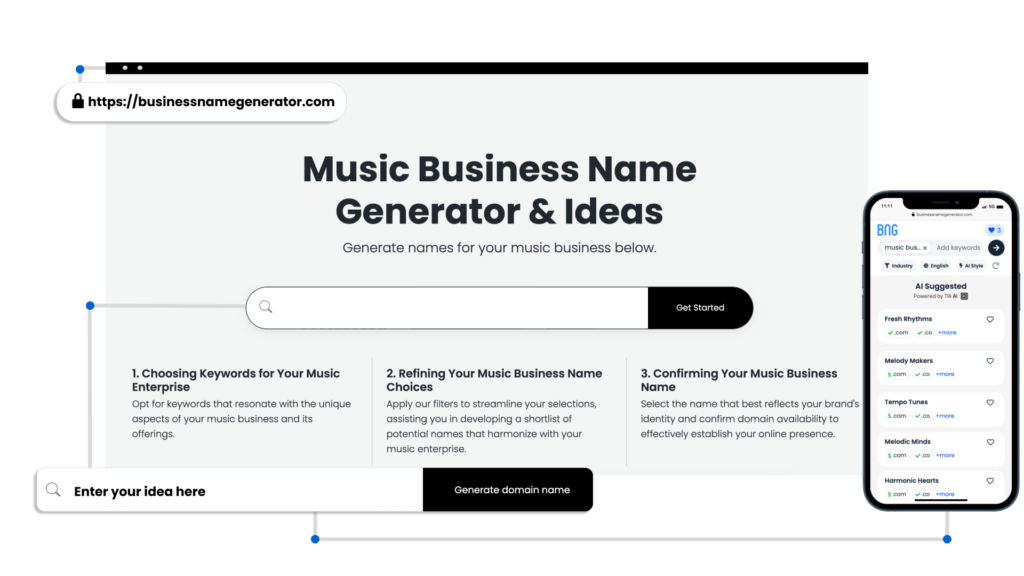Benefits of Our Music Business Name Generator

Quickfire naming solutions
Tap into a rich selection of music related business names with instant results. Our generator strikes a chord with its speed and variety.
Branding ensemble
Craft a logo that sings in harmony with your new business name. Visual branding becomes a synchronized melody with our tools.
Domain availability harmony
Set the stage for your digital presence with a matching domain. A cohesive online identity is vital for your brand’s chorus.
Bookmark potential winners
Curate a playlist of top name contenders. Revisit and refine your selection, ensuring your final choice is pitch perfect.
Trademark rhythm
Secure your brand’s unique sound in the marketplace. Trademark options protect your music business’s name from copycats.
Top Tips
Harmonizing Your Brand: Naming Your Music Business

Understanding the Music Market
Recognize the genre and niche of your music business. Whether you’re a record label, a music shop, or a festival organizer, your name should echo the essence of your speciality, like ‘VinylVibes’ or ‘FestivalFrontiers’.

Memorability and Simplicity
The best names are like catchy hooks in a hit song. They’re easy to remember and roll off the tongue, staying with your customers long after they’ve encountered your brand.

Reflecting Musical Identity
Your name should be a reflection of the musical journey you offer. It could be as energetic as ‘RaveRhythms’ or as soulful as ‘JazzJourneys’, aligning with the experiences your business promises.

Innovation and Adaptability
Choose a name that allows for evolution, as the music industry is constantly changing. A name like ‘MelodyMakers’ suggests an ongoing creation of musical wonders.

Global Appeal
Aim for a name with worldwide charm. Music is a universal language, and a globally appealing name, like ‘GlobalGrooves’, can open doors to international markets.

SEO Friendly
Incorporate musical keywords that strike a chord with search engines, increasing your visibility to potential patrons and partners in the industry.
Get Inspired
20 Music Business Name Ideas for Inspiration
These suggested names for your music business can catalyze your creativity and lead you to an exceptional music business name.
- BeatBarn
- SonicScape Records
- RiffRetail
- EchoEmporium
- PulsePoint Music
- LyricLounge
- RhythmRanch
- NoteNest
- CadenceCrafters
- MelodyMarket
- ChordCove
- TempoTrove
- SoundSpectrum
- VibeVault
- TuneTrade
- HarmonyHaven
- AllegroAccessories
- PitchPlace
- ScaleStore
- OpusOutpost
Successful Music Business Names
| Business Name | Implication |
|---|---|
| Crescendo Collectibles | Evokes building intensity in music |
| Bassline Boutique | Suggests a focus on foundational rhythm |
| Harmony Hub | Implies a center for musical collaboration |

Get the Business Buzz
Subscribe to our newsletter for weekly business insights, including:
- Trending business news
- Exclusive subscriber perks
- Actionable growth tips
Toolbox
Our Business Name Guides
Take the First Step in Creating Your Business Name
Author
Methodology
- Industry-leading business name generator:
How does our generator work? Our tool uses an OpenAI API integration to generate creative, contextually relevant business names. We keep the users in mind and regularly test, update, and release new features to support them. - We have a team of experienced writers:
Our team of specialist in-house writers are here to share their knowledge and help your business get off the ground. - We offer value-added content:
Our team of experts has the passion and decades of expertise to write support guides, news, blogs, and videos to help you tackle setting up your new business. - We fact-check our content:
Our editorial team fact-checks every piece of information and uses industry-leading insights to include relevant, up-to-date stats and recommendations.

Leave a Reply